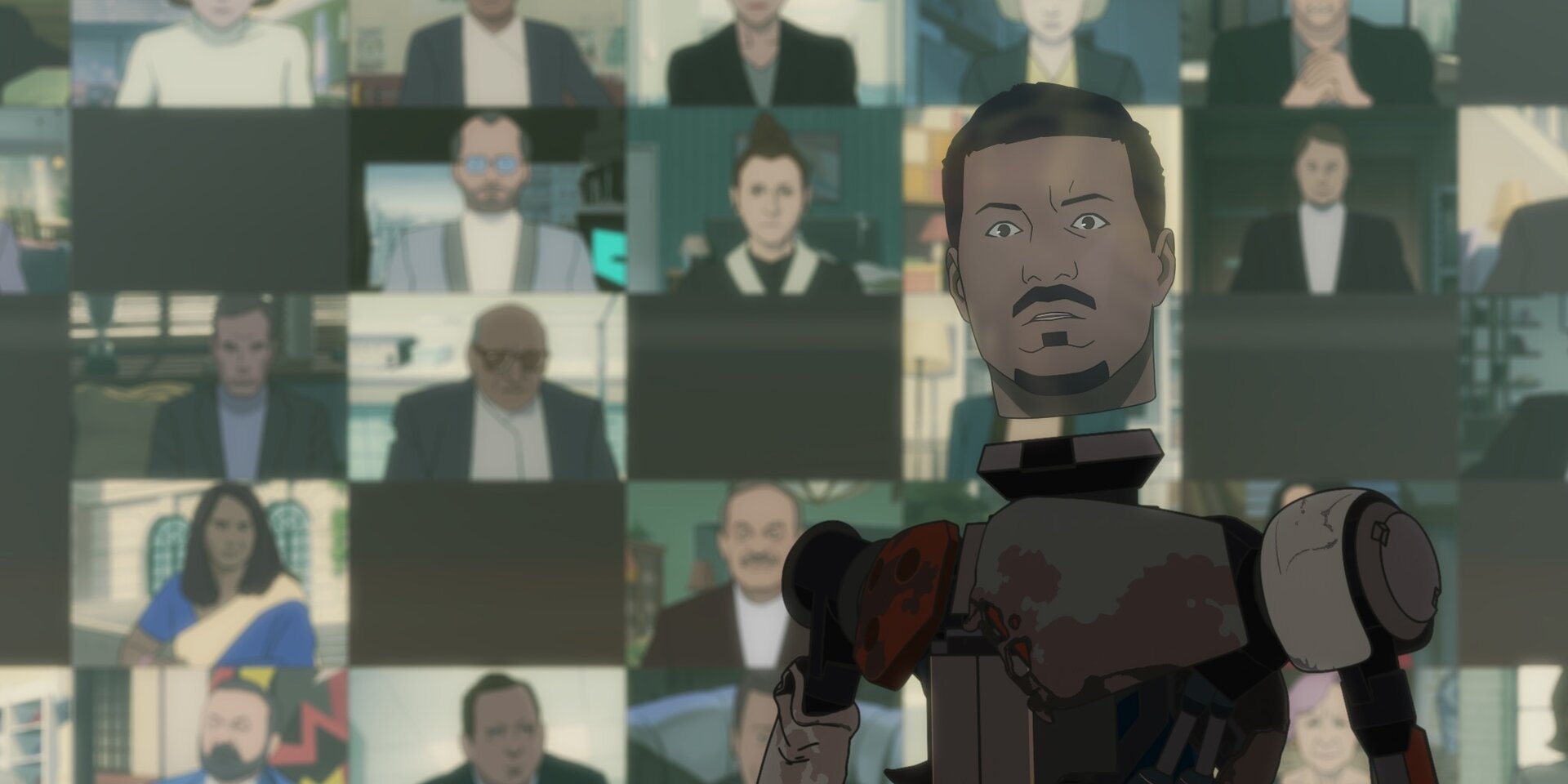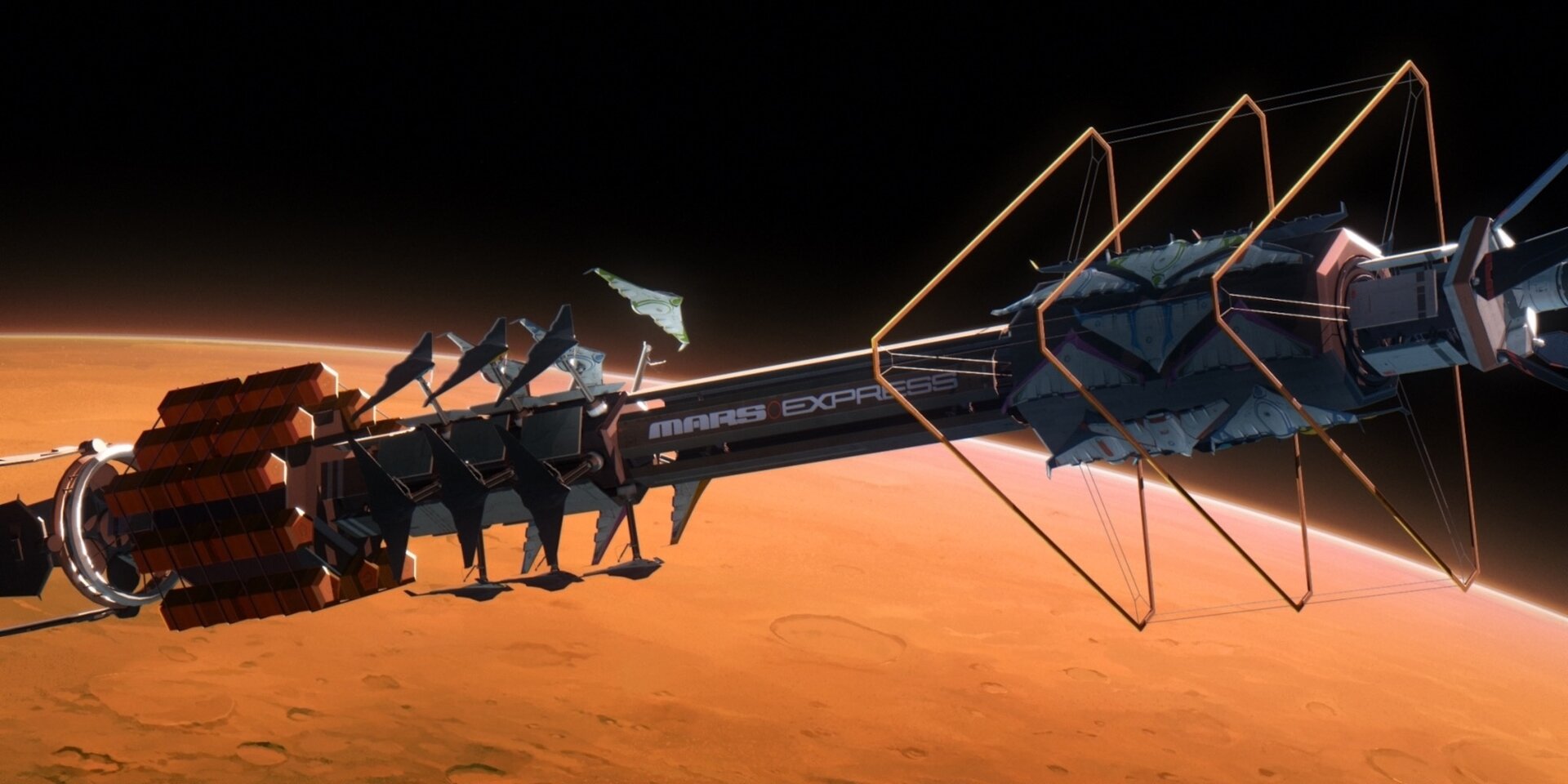«Mars Express» - Film Review by Kinoafisha

The ship will proceed without stops.
On May 8, thanks to the efforts of the film company "Pro:Vzglyad," one of the brightest animated films of 2023 is being released in Russian theaters — the French sci-fi animation "Mars Express" directed by Jérémie Périn. The world premiere took place last May at the Cannes Film Festival, after which "Mars Express" entered the main competition at the Annecy International Animation Film Festival, and was later nominated for a César Award, where it lost to another excellent work — "Chicken for Linda!" by Sébastien Laudenbach and Chiara Malta. While in "Chicken…" the main character spends the entire film wandering the streets of Paris trying to catch a runaway chicken, here things are more serious: viewers are sent into the distant future, and the world, as it should be, is on the brink of catastrophe.
The year is 2200. Life is almost the same as now, only technologies have, of course, penetrated even deeper into human everyday life, and giant corporations have become even better at hiding their power. Over two hundred years, people have acquired many androids, created a colony on Mars, started befriending artificial intelligence, and figured out how to continue living after death (it's simple: you insure your memory and then "upload" it into a robot). The smartest inhabitants in this universe naturally become hackers (who else), and the bravest become detectives. The main characters of this film are such a pair.

Aline and Carlos are detectives investigating crimes of the 23rd century. Aline (voiced by Léa Drucker) is a pragmatic blonde who served in the army in her youth; Carlos (Mathieu Amalric) is an android who used to be an attractive mustached man but died on one of his missions, so now some features of his appearance reveal that he is a robot, and his ex-wife refuses to talk to him. The mission that begins "Mars Express" is to find and capture one of the main hackers of the present day; they will succeed in this, but while returning from Earth to Mars, their prisoner will hack the system, and the arrest warrant will disappear from the database. The second case (around which not only the plot of the film but also the fate of human civilization will revolve) is the strange disappearance of a girl who was just studying at a university, earning some fabulous money, and now, apparently, someone needed to kill her. Aline and Carlos will quickly identify the killer, but the question of why he needed to do it will remain open for a long time.
This investigation will become the main plotline of the film: the entire marvelous new world, filled with stunning details (such as a farm using brains and a cat that turns out to be a small household android), will be strung on it. The setting is wonderful: it's unclear how pleasant it is to live there, but observing it from the outside is a pleasure; fortunately, director Jérémie Périn has enough imagination to handle this quite ambitious task. Along the way, "Mars Express" will subtly remind us of its distant and close relatives: it will nod to "Blade Runner", recall "Fast & Furious" or "Star Wars" and even start playing with Japanese animation traditions. But to avoid getting too carried away with high-tech images, in the year 2200, there will, of course, be moral dilemmas, even more intense than those of today's humanity. The main question of the era is about the nature of robots because, despite becoming an integral part of this vast world, people still seem undecided on how to treat them: some want to destroy them, others to grant them freedom, some work with robots as colleagues, and some engage with them romantically.

Of course, "Mars Express" conveys the idea we've heard a thousand times — that technology evolves, and although people have learned to communicate over distances, they remain selfish. The difference here is that this simple message seems to hide behind complex plot twists and a genre shell, so it doesn't appear banal. And the plot is indeed quite convoluted, so an inattentive viewer might even be confused: they haven't yet grasped the rules of this world, and already they are being told a story containing several overlapping white spots. But this state seems to perfectly match what the detective heroes on screen are experiencing: at some point, they understand even less than we do (at least because they are about to lose the world they live in, while for us, it's just a movie).
In the end, it seems "Mars Express" becomes a statement about total uncertainty in one's life and distrust of the outside world amid its global complication. If today an ordinary person doesn't understand how their phone works, in a couple of centuries, the whole world will turn into one big gadget — and what to do when it stops working is unclear. Everything can disappear: a person might suddenly turn out to be a robot, and the sky above—a projection; the world we get used to from the beginning of the film might turn into something entirely different, and the reality where the main characters exist can be snatched away from them right under their noses. At some point, a literal countdown on a stopwatch will start here, and only a couple of minutes will remain until some unknown changes (an homage to another popular sci-fi — "The Three-Body Problem"). If people don’t act out, they will survive, the apocalypse is still far off, and for now—a completely new world just arrives in an instant. The old one will literally fade into oblivion overnight.

This film seems to be made for optimists, who in recent years appear to have definitively become an endangered species. So if you are among them and still believe that "the future will be better" and that progress will solve all our problems, don’t be deceived. Life on Mars exists, but it is hardly more pleasant than the one we want to escape from. Memory can be completely erased, but it is unlikely to bring us blissful oblivion. It's better to just be content with small things: for example, the joy of watching a movie — and specifically, the pleasure of a good animated film with stunning visuals and a somewhat overloaded plot. It seems that we can still trust art, especially when there are some issues with the new version of reality: our past is murky, and as we know, not everyone will be taken into the future.